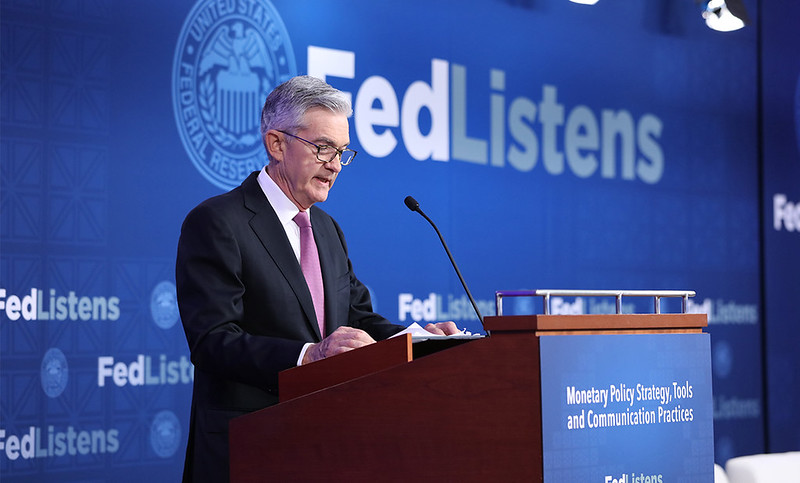
(Photo : Flickr)
US Federal Reserve chief Powell
- Federal Reserve policymakers signal support for U.S. interest-rate cuts due to low inflation and a cooling labor market.
- Investors anticipate the central bank to begin lowering rates in September, impacting gold prices and the U.S. dollar.
- Global factors like the Mpox situation in Asia and the conflict in Gaza can influence market sentiment and the Federal Reserve's decisions on interest rates.
- The Reserve Bank of India is adopting a cautious approach to monetary policy due to concerns about high inflation.
Federal Reserve policymakers have recently signaled their support for U.S. interest-rate cuts starting next month, as inflation is significantly down from its highs and the U.S. labor market is cooling. This stance was expressed by Philadelphia Fed Bank President Patrick Harker and Boston Fed President Susan Collins in separate interviews. Harker stated that barring any surprise in the data, he believes the process of lowering rates needs to start, favoring a slow, methodical approach. Collins echoed this sentiment, indicating her likely support for a rate cut at the U.S. central bank's policy meeting next month.
The U.S. central bank is widely expected to begin reducing its benchmark policy rate at its upcoming meeting, buoyed by encouraging inflation data and increasing concerns about the health of the job market. The Fed targets 2% annual inflation by the personal consumption expenditures price index; by that gauge, inflation was 2.5% in July.
However, not all policymakers are in a rush to ease policy. Kansas City Fed Bank President Jeff Schmid, one of the U.S. central bank's more hawkish policymakers, stated that there is some room to consider where to go from here, but he believes there is time. He added that it's worth looking harder at the recent rise in the unemployment rate, which measured 4.3% in July.
Market Anticipation and Impact on Gold Prices
Investors have been expecting the central bank to begin lowering rates in September and have shifted their attention to what happens after that. Bets on fed fund futures currently predict policymakers will cut by 75 or 100 basis points, in total, by the end of the year. Officials should move gradually when they begin easing, Collins said, emphasizing she's not seeing any "big red flags" in the economy. The Boston Fed chief said she's focused on "preserving that healthy labor market while we continue to bring inflation down."
The anticipation of interest rate cuts by the Federal Reserve has led to a rise in gold prices, as lower interest rates typically weaken the U.S. dollar and reduce the opportunity cost of holding non-yielding bullion, making gold more attractive. Spot gold prices have increased, with yields on U.S. Treasuries falling, further boosting gold's appeal.
Global Factors and Other Central Banks' Responses
Global factors like the Mpox situation in Asia and the conflict in Gaza can influence market sentiment by introducing uncertainty and risk aversion. If these events lead to broader economic disruptions or affect global financial stability, they could impact the U.S. economy through trade, investor confidence, or commodity prices. This, in turn, could affect the Federal Reserve's decisions on interest rates.
The Reserve Bank of India (RBI) is concerned about the persistence of high inflation, especially given that food prices, which are a significant component, are not falling as much as they did last year. This raises the possibility of more generalized price increases. To address this, the RBI is adopting a cautious approach to monetary policy. While it has not yet announced a rate hike, the central bank is closely monitoring the situation and may adjust rates to prevent inflation from getting out of hand, balancing the need to control inflation with the potential impact on economic growth.
In conclusion, the Federal Reserve's anticipated interest rate cuts reflect a careful balancing act between supporting economic growth and controlling inflation. The decision, influenced by both domestic and global factors, will have far-reaching implications for the U.S. and global economies. As Fed Chair Jerome Powell has emphasized, these decisions are based on data and economic conditions, not political considerations, underscoring the importance of the Fed's independence in maintaining economic stability.
* This is a contributed article and this content does not necessarily represent the views of btin.co.in









